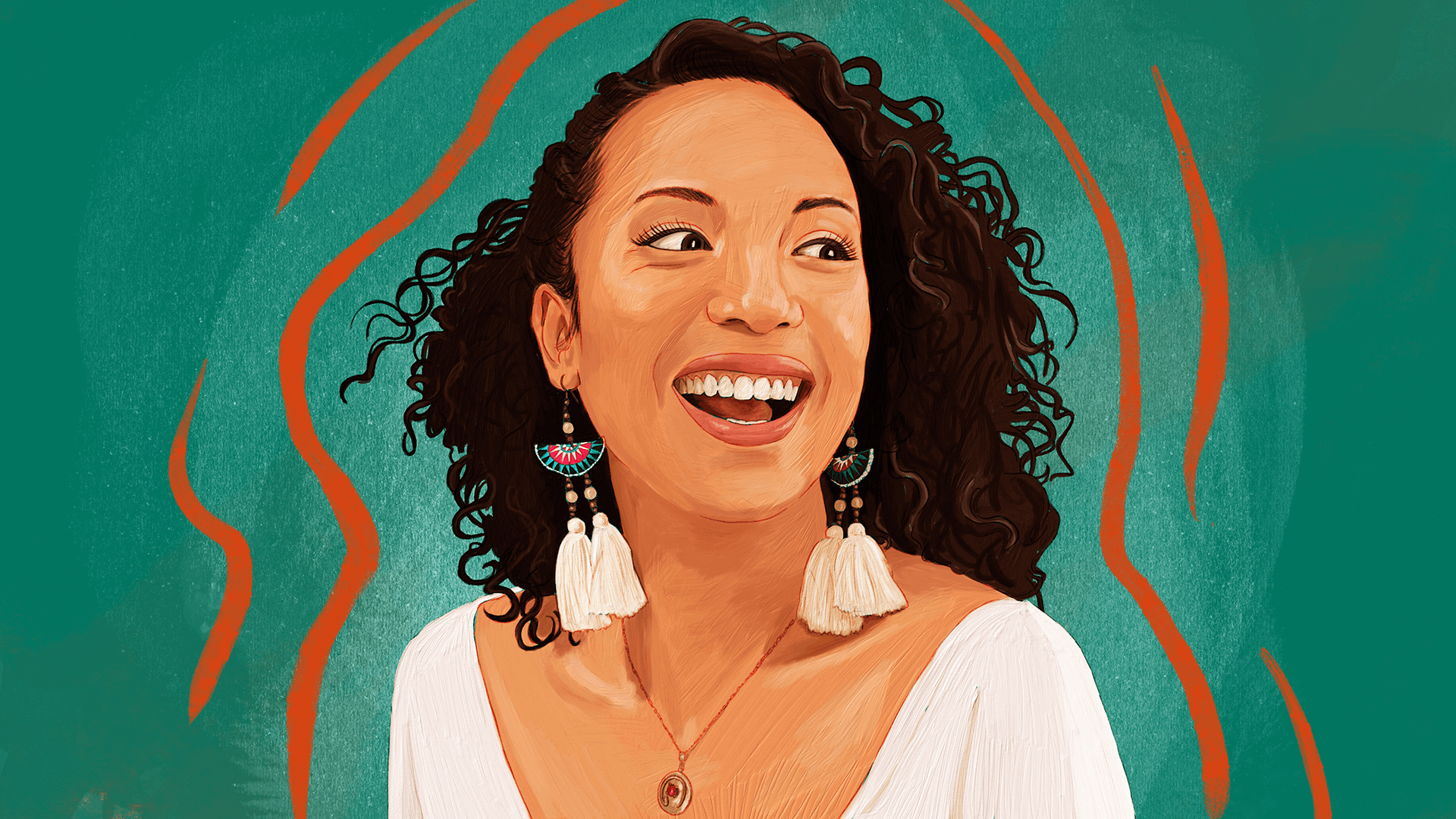Berna Anat started learning about personal finance after racking up $50,000 of student loan and credit card debt a few years after graduating from college. As the first-generation daughter of immigrants from the Philippines with no financial background, she was never taught about the basics of budgeting, savings, debt, or investing. And diving into the personal finance world was not easy.
“My financial education was hella male, hella pale, and hella stale,” Anat says.
She felt like she was piecing together her financial picture on her own. So she started putting her own humorous flair on personal finance and started posting about her financial journey on Instagram. It took off. She paid off her debt with the motivational help of an ex-partner within a few years. Then quit her job, traveled for a year, and launched her own financial education platform. Most recently Anat teamed up with Betches Media to host the “Money Please” podcast.
We sat down with Anat this week and chatted about her debt repayment journey and the importance of treating yourself.
This interview has been edited for length and clarity.
Why is it important to have a sense of humor when we talk about money?
I learn better when I'm laughing and when I'm relaxed. I find myself translating concepts in funnier ways so I can digest it. Once I found that connection for myself, I thought, what if I translate what budgeting is in my language, but out loud to other folks.
I started to share what I was learning a little bit on Instagram and on YouTube. And the response was tremendous. It was surprising. A lot of my content is surprising to people on so many levels because we're taught to never talk about money. In my family, it was like, we don't tell anybody else about our financial situations. We only flex on people. We never ever show what the issues are. So when you start to learn things — it's dry as hell. It's not funny. It's very stale.
Finding humor in finances is like the spoonful of sugar to make the medicine go down. Humor is so important to me because everybody wants to laugh. We're all tired and we're all sad and everything is a garbage fire. I personally don't need more serious issues in my life. I think people really appreciate taking a humorous lens to something that is typically so serious. Being able to take in new content in your life and learn something new without crying — it helps.
Some money truths can be hard, like debt. How can people find that balance of humor & transparency?
For folks first starting off their financial journey it's so important that you feel comfortable and warm. I get so excited when people find me first and I can help kick off their financial journey. And if they go down many other rabbit holes, at least now they feel welcome at the party. Now they know that they belong and they feel sort of warmed up and ready. And that's enough for me. I personally spent way too long in these education circles to ingest this information while fighting against the feeling of “I don't belong here.”
There are so many different kinds of personal finance creators and you can find them on Instagram, TikTok, YouTube, podcasts, or books. Don't be afraid to shop around until you find someone whose voice you really relate to on a cellular level. After that, all of the information will go down so much faster and easier. It will also be so much more enjoyable when you find the voice that you really connect with.
You’ve had to face some hard truths yourself, like tackling $50,000 in debt. How did you pay it off?
I absolutely had no plan until I was 25 or 26. I was very stubborn and felt that I had to go to the most competitive and expensive school that I got into, USC, and got out of there with about $42,000 in student debt. Then I thought it would be really smart to be a freelance writer in New York City. I ended up in $12,000 of credit card debt.
I was in the shadows feeling shameful about it, acting like it didn’t exist. I threw money at the minimum. But to be totally honest my financial journey started when I started getting paid better. That's really what it was. You can't budget off of money that you don't have. All the financial like education I could have taken in, at that moment I was in survival mode.
When my paychecks are coming every two weeks, that's when I realized I should figure out this ancient art of budgeting. And let's start to put together some financial goals and I could try to knock them down one by one. It was a lot of Googling and self-education. But I was able to knock out my $12,000 of credit card debt. And then I kept up that same energy and built an emergency savings account. Then I started my life basically again, kept up the energy savings and started my going down the student loan journey.
For others who may be struggling with debt, what’s your advice for figuring out the best debt repayment plan for them?
If you are not making enough money to survive or to pay your absolute basic needs from month to month, it is very difficult to pay off debt. And the fastest way to pay off debt is to get paid more. Hard stop. None of the tips or tricks will work for you if you don't have extra money at the end of every month to put aggressively towards your debt.
The first thing folks should look at is their basic budget. Are you covering everything you need to survive? How much money outside of what you need to survive at the end of the month? That's the money that you're going to put extra towards your debt. The second thing I would say is get a free debt calculator. I don't love math and a debt calculator basically helps you plug in all the numbers.
What does financial freedom look like? How can people start their own journey to financial freedom?
Financial freedom looks differently for everybody. We are living under constant financial anxiety all the time, especially if you are in debt. Being able to pay off my credit card debt, which is known as one of the most expensive forms of debt, loosened a notch on my financial belt. Building an emergency savings to financially have my back if anything wild happens loosened three more notches on the belt. Then taking down my student debt at the time frankly made me financially naked. That’s when pants just came right off. That was so much financial freedom for me. At that point I didn't have any other financial obligations besides myself.
Financial freedom to me is time and financial freedom is rest. Speaking from a first-gen lens and coming from an immigrant family, the luxury of rest is not common. So for me and my generation, financial freedom is for us is the most luxurious financial thing we could be building towards.
What’s your biggest money stress right now? How are you overcoming it?
Right now I am in a very interesting chapter of my life where I'm living on my own for the first time. The one thing that's stressing me the most financially is also giving me the most joy. And that’s the ability to live in an apartment in San Francisco.
I come from many years of financial scarcity of not having enough to be splurging in this way. So my initial reaction to all of this was, ‘oh no, do you deserve this?’ ‘Is this smart for you to do?’ ‘Is this stupid?’ Maybe I should be being frugal and allocate my money in a different way.
I tell myself I'm not going to be spending money on an apartment in San Francisco for ever, but I do need this right now. It definitely helps with my financial stress. I am unpacking the stress and calming down from the former survival and scarcity mentality to embrace what it is I need right now — balling out because I worked really hard this year and I deserve it.
Why is it important to treat yourself?
The way that I reason it with myself is, I could get hit by a bus tomorrow. We know because of the internet, that the world is a garbage fire and anything could happen at any time. Now is the time to live.
You can't necessarily hang your entire financial strategy on that because of course that would be chaos. But I think it's worth taking the time to ask yourself what kind of bad things have you gone through in the last year? What do you admire about yourself that you got through? Didn't that require strength and resilience? Didn't that require time and sacrifice of sleep? Give yourself credit for the things that we've all been through. Because we have all been through something in the last two years.
It's incredibly important to treat yourself because one, you don't know how long your current privileges will last and two, Because that is the purpose of life.
Make sure you're giving yourself the recognition you deserve for the work you've done. Make sure that your money flows into the places in your life that make you feel fulfilled. As opposed to the places that signal fulfillment and coolness to other people. Self care is incredibly important because if you got hit by a bus tomorrow, you will not wish that you worked harder, you will wish that you took that all-inclusive vacation to Cabo.
Image: Michelle Kondrich


